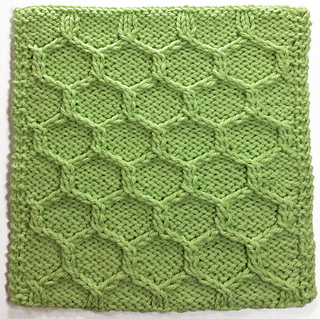patterns > Authentic Knitting Board >  Knitting Board Blog Website
Knitting Board Blog Website
> Twisted Trellis Stitch: Stitchology 30



Twisted Trellis Stitch: Stitchology 30
The celebration of the Fair Isle has come again…March is the month of St Patrick’s Day! What better way to put us in the true spirit of all things green and magical than to work a stitch that whorls and twists across the pegs? If it looks rather complicated to manage, no worries, because it’s actually a fairly easy stitch to do! The cables are done by simply twisting two peg’s stitches at a time as you work through the rows.
We will be changing the format just a little bit for our Stitchology Column. Each of the featured stitches will be explained row by row via both written and video instructions. We will be focusing on highlighting the repeating stitch pattern itself, so that you can enjoy the freedom of putting these new stitch patterns to use in your own projects as creativity strikes. We hope you will enjoy this new way of learning new stitches with us! :) All these things will be included at the link to the Knitting Board Blog above.
For those of you who are still desiring a pattern for a square to continue with your afghan plans, the information on yarn used, etc can be found below, and the chart for the square can be downloaded right here AT THIS LINK. I hope to continue providing this extra step for my readers as long as I can. Enjoy!*
Items Needed
Loom: Authentic Knitting Board Adjustable Hat Loom: 2 rounded pieces + 3 peg connectors, with pegs in all holes for a 3/8” gauge. The Sock Loom 2 or the All-n-One Loom could also be used.
Yarn: approx. 75 yards Worsted Weight (Sample uses Berroco Vintage in kiwi)
Notions: Loom tool, yarn needle, scissors. (Also helpful: cable needle, peg markers, row counter, and blocking pins)
Pattern Notes:
To work this pattern in the round, such as for a hat, use the Repeating Pattern Rows chart, and make sure to read it from right to left for each row, rather than alternating sides each time. Also, cast onto your loom in a clockwise direction, using a number of pegs that is divisible by 8—the number of stitches required for each pattern repeat.
For flat pieces of a greater size, simply increase the number of Repeating Pattern Rows inside the garter stitch edges for the length and width required, then complete with the Finishing Rows.
82598 projects
stashed
45955 times
- First published: March 2017
- Page created: March 16, 2017
- Last updated: November 23, 2025 …
- visits in the last 24 hours
- visitors right now




